Africa has a language problem. We don’t read enough in our indigenous languages, and we don’t read in the same foreign language.
The scramble for Africa left us with a flock of imported languages—French, Spanish, English, Portuguese—and as many literary cultures that unfortunately don’t cross over frequently enough. But we have made these foreign languages our own in exciting ways, especially in fiction.
One solution for the lack of crossover is translation, and we are seeing more and more works breaking through into languages other than the ones they were written in, but are we doing enough to build linguistic bridges, to find out what, say, Francophones, or Lusophones are writing and reading, or are we staying in our old colonial camps?
After seeing the phenomenon of #AbidjanLit unfolding online, Efemia Chela decided to engage translator, editor and writer Edwige-Renée Dro to discuss what she thinks about the exciting literature being read and written in that city.
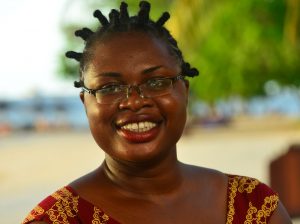
Efemia Chela for the JRB: I’ve seen Abidjan Lit popping up a lot on Twitter for the past year and a half. It seems part book club, part reading movement. What’s it all about? Who is involved and how did it come into being?
Edwige-Renée Dro: Whatever Abidjan Lit is, it wants to put books at the centre of lives and at the heart of cities, cities in Côte d’Ivoire but also cities throughout the black world. We actually don’t like labels, that’s why I didn’t call it a movement, but if JRB wants to call it a movement, let it call it a movement; our hope however is that it doesn’t become one of those generic terms that don’t mean anything.
Abidjan Lit is literary activism and those of us involved have multiple origins, like most people. The name Abidjan Lit itself a play on words. We notice our Anglophone friends pronounce the ‘T’, thus creating the impression that it is Abidjan Literature—again, we don’t impose so we are happy with Abidjan Literature, but in the Francophone world we pronounce it Abidjan Lit (‘lee’), and it means Abidjan Reads.
So what is Abidjan Lit about? It is about literature. We are saying that in our country, Côte d’Ivoire, we read. We often hear that Ivorians don’t read, but if they don’t read, who are those people standing in front of newspaper stands every morning reading the titles? They are called titrologues. If Ivorians don’t read, who uses those librairies par terre? (Librairies par terre is literally translated as ‘bookstores on the ground’, but it means secondhand bookstores.) Abidjan Lit also says that Ivorians and Africans read a wide range of literature, and we don’t do that thing of ‘African literature’.
We are five lovers of books in the Collective, with bloody strong personalities. The type of people who have no qualms about saying an idea is crap if it is crap. We had been talking about our love of books for a while, then Laure Blédou and I went to Writivism in 2016, me as a speaker and Laure as a shortlisted writer and a participant of the Arts and Literary Entrepreneurship course, and after that, we came back to Abidjan and told the others we had to go ahead and set the thing up already. Laure and I were prodded by James Murua and Kgauhelo Dube [founder of Long Story Short], so we couldn’t let those people down. Then we’d spoken about the idea to the University of Bristol, which was running the course, and they offered us some mentoring, so we had to do it.
The JRB: It sounds like an exciting exercise in literary activism. Especially because it challenges the problematic and widely held idea that Africans can only be experts on and read African literature. How often does the Collective meet? What was the last book Abidjan Lit read? And what are some of the most unexpected revelations, talking points, connections that have arisen from the meetings?
Edwige-Renee Dro: We organise what we call ‘chapters’ every other month. Our third chapter for example was titled ‘[no] More Dreams’ where we explored what African and other writers have written about what it means for an African or black person to dream, and we asked whether we should dream some more so as to better shape those dreams we hold, or if we should stop dreaming and just work now. We held the last chapter on Twitter; the plan was to have a physical meeting as well but on the day we were supposed to hold the chapter there was a mutiny. We decided that the sounds of guns were going to overwhelm the sounds of literature, and in the end we were heartened by having so many people, and a newer audience, participate in that conversation. It was wonderful to be discussing the classics of Ivorian literature amid all that military tension, and that all those people who chose to engage with us online would not be held hostage by a few disgruntled soldiers.
The JRB: Talk about the resilience of literature! Personally, you’re a triple threat—writer, translator and editor. As an editor and writer sometimes I struggle to separate the two. Editing creeps in when I’m trying to write with abandon. Do you find multiple powers hinder or help your creativity?
Edwige-Renee Dro: Well, I identify first and foremost as a writer and I love writing, and reading. Of course, when you write, you have to edit, to produce something decent. I moved into literary translation because I wanted my father to be able to read what I was producing so that we could talk about it. It is that writer’s ego .. and the only person who could manage my ego was my father.
One of the skills I’m most proud of is my ability to compartmentalise, so when I’m in the process of writing, I’m in that process, and when I edit, I’m editing. There is no point editing something that is not written, and no point translating something that is not written or edited. Although I love translating or editing my own work, I really like translating the work of someone else. I actually taste the words. I find myself becoming one with each word. The dictionaries are out, the thesaurus is there, you read a text again and again, trying to get inside the head of the writer, wondering, ‘So is that how you think, you this person?’ Because translating goes beyond just reading something. And then you finish that first draft and you have that conversation with the writer, and then you go back to the texts, both the writer’s and yours, and you rework it again.
The JRB: We’re definitely seeing a move towards promoting fiction in translation overseas, with Rochester University especially trying to tackle the ‘three per cent’ problem, where about only three per cent of the books published in the US are works in translation. The Man Booker International Prize notably also increased the prize share for the translator of the winning book. Readers also seem to enjoy good translation. Books like Elena Ferrante’s Neapolitan Quartet and Han Kang’s The Vegetarian are bestsellers and are picking up nominations and awards. What do you think has sparked this change, and what effects do you think it will have on books by African writers?
Edwige-Renee Dro: Well, the change has been sparked by curiosity. There is so much literature out there, so much of it beautiful, varied and producing different kinds of conversations. Sometimes I read discussions on Facebook about, oh, that Tram 83 book, and there were all these discussions, and I was like, oh the Anglophones have started again. Yes, I read that book twice, once before it was even going through the translation process and then another time when the translation came out, and I wanted to read it in French again. I like both the translation and the original, actually, but I read the conversations and I was like, people, sometimes in the Francophone African literary world, at least, the beauty of that French language and the colour have to play a role. But the change is sparked by curiosity. I even want to learn Spanish so I can access more literature, because can you imagine what else is out there that we are not accessing?
As for the effect on books by African writers … have we sorted out the discussion of what an African writer is yet? [laughs] We waste some time on shit on this continent and in our diaspora, I tell you.
That was an aside. Not every book produced by an African writer is going to be translated into English or Portuguese or Swahili, simply because for a publisher to decide to translate a book, they must decide if it makes some sense, and I suppose, commercial sense. Publishers are not charities.
I think the climate we have today should be seen as an opportunity that has been afforded to us as literary actors from Africa. I say literary actors or even cultural actors in Africa because I was on a panel with my dear, dear writer-friends Abubakar Adam Ibrahim and Odafe Atogun recently, and one participant said that we were focusing on translating into European languages but what about translating into, say, Hausa, because how are our children going to learn our languages otherwise? See the responsibility that some people want writers to have? I write. I translate. I edit. I’m not an ethnologist. I’m not the minister of culture. I’m not a dean of a university.
Where are the training programmes for aspiring translators or editors? How many departments for literary translation do we have in our universities in Africa? How many publishing houses do we even have in our countries? Cassava Republic can’t do everything, great and fabulous they are. Farafina can’t do everything. Jimsaan cannot do everything.
So whatever effect this boom in translation will have on literature from Africa is what we as actors will do, and we need to have the conversation among ourselves first. We get annoyed when Aaron Bady writes an introduction to Kintu, we accuse the West of only wanting literature from Africa that does the apology of poverty, we bemoan the fact that African literature is being discussing in London, etc etc. But let’s go beyond bemoaning now. What are we doing?
I was at Writivism last year and there was a participant who said, ‘And of course we welcome here our Francophone colleagues who write in a colonial language.’ I had to laugh. Do you think it is only you, the Anglophones, who have managed to bend English and the rest of us are speaking like Molière? I read a paper where Bernard Dadié had to be described as the Chinua Achebe of Ivorian literature. Did I write a Facebook post about it? I didn’t, because that paper is targeted at an Anglophone audience—by the way, it is an African paper, not one sponsored by the West—and Dadié is not as well known as [Ahmadou] Kourouma, say. That is the reality. Again at Writivism, the organisers set up a panel on literary translation, but when it was happening I think we had one or two other guests in the room with us. Everybody else went to talk about sexual harassment because they could harangue better, I suppose. So let’s not behave the way we ourselves do, and then get up in arms about what the West is promoting. To paraphrase de Gaulle, ‘People don’t have friends, they have interests.’ We should be deliberate about the literature we want to come out of this continent. We should be deliberate.
The JRB: I certainly agree with you to some extent. Literary translators in Africa definitely need far more support. Publishing is a tricky venture, and the bigger houses are certainly quite conservative when it comes to choosing what to publish, before we even get to the idea of publishing something in two or even three languages. I think small presses may be able to save the day by taking bigger risks, though there would need to be a lot more of them to make an impact.
Controversial question now, do you think that Francophone readers make more of an effort to read Anglophone work than the other way around? How do you think we rectify that unequal power balance?
Edwige-Renee Dro: I’m thinking about a project … but since I’m not even at the conception stage yet, I will keep it to myself lest it become a miscarriage before it has even embedded itself in the womb. Do you know, I read more books by writers from Africa when I lived in Europe than I do here. It is only when I go to festivals that I have the chance to acquire books by writers from Africa. The books need to be available in our bookstores and we need to have the bookstores also, and then we need marketing around these authors and their work.
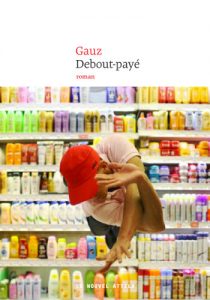
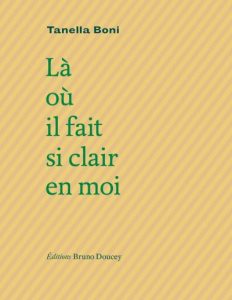
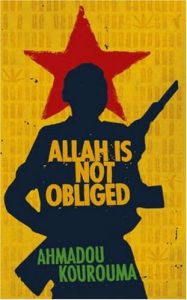
I think both Francophone and Anglophone readers read the books that are available. As much as I rave about Debout-Payé by Armand Gauz and as much as you desire to read it, unless it is translated, you are not going to read it. At least not now. The solution is not to learn the language either.
The JRB: That’s very true. For someone who has never read Ivorian literature, where would you recommend they start? What are some of your favourites?
Edwige-Renee Dro: I love Kourouma! He is my love. And I love Armand Gauz. Of course [Véronique] Tadjo and Tanella Boni are other Ivorian writers that I like. I like Charles Nokan, Jean-Marie Adiaffi, who is just crazy—I love crazy talented people. Writers who understand the craft of writing. At the moment, Ivorian literature is going through a mediocre phase, and the reason why is because the other bits of infrastructure that are necessary for creating good literature are non-existent. As the situation currently stands, I will not send my manuscript to any Ivorian publisher. At the moment, we have a lot of people self-publishing and they are self-publishing in order to say, ‘I’m a writer’. To self-publish, you need to have some money. But you read the stuff and you think of all the poor trees. There is talent however; I want to believe it. We just need to unearth it, and unearth is the operative word here.
The goal of Abidjan Lit is to contribute to that unearthing. We are launching a short story competition soon, and watch this space!
- Efemia Chela is Francophone & Contributing Editor; follow her on Twitter
Index
Authors
- Abubakar Adam Ibrahim
- Ahmadou Kourouma
- Armand Gauz
- Bernard Dadié
- Charles Nokan
- Chinua Achebe
- Edwige-Renée Dro
- Elena Ferrante
- Han Kang
- James Murua
- Jean-Marie Adiaffi
- Kgauhelo Dube
- Laure Blédou
- Odafe Atogun
- Tanella Boni
- Véronique Tadjo
Books
- Debout-Payé
- Kintu
- Tram 83
- The Vegetarian
Topics
- Abidjan Lit
- Cassava Republic
- Farafina
- Indie publishing
- Man Booker International Prize/li>
- Titrologues
- Translation
- Writivism




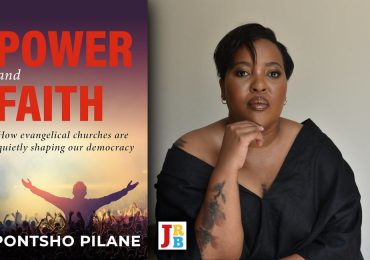

One thought on “Literary activism in Côte d’Ivoire: Edwige-Renée Dro explains the Abidjan Lit phenomenon”